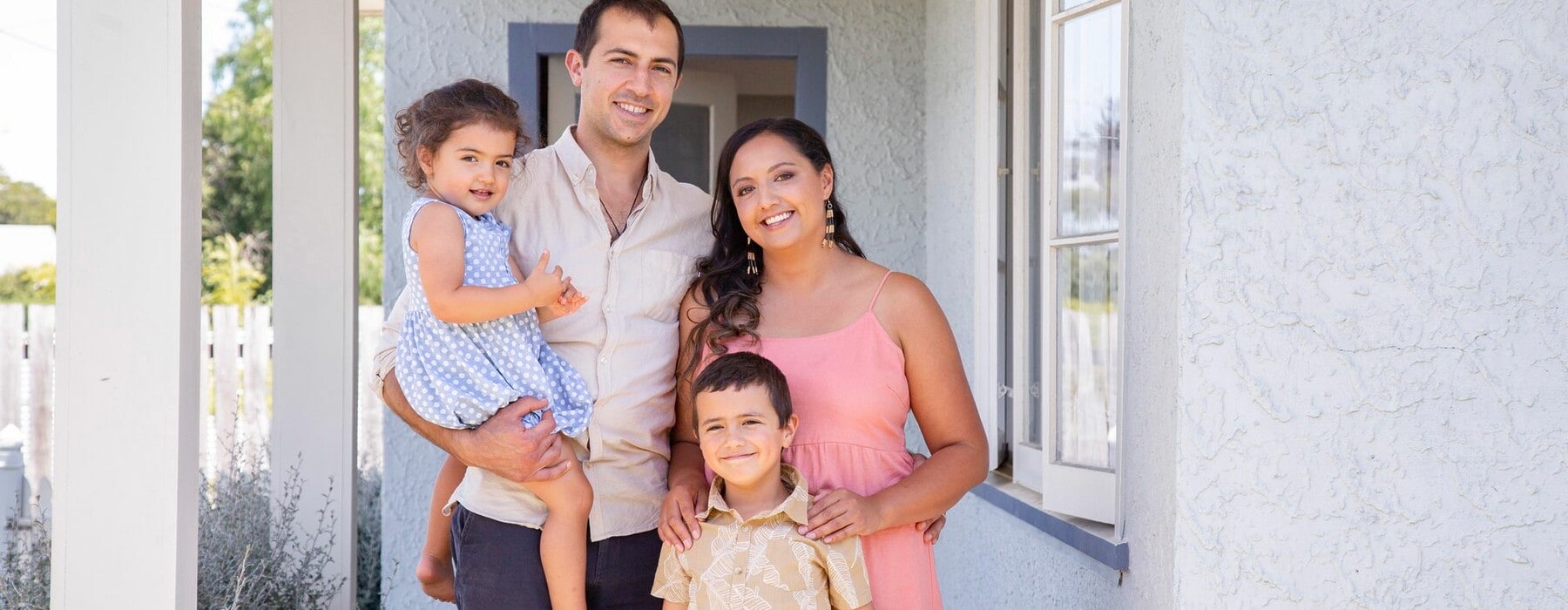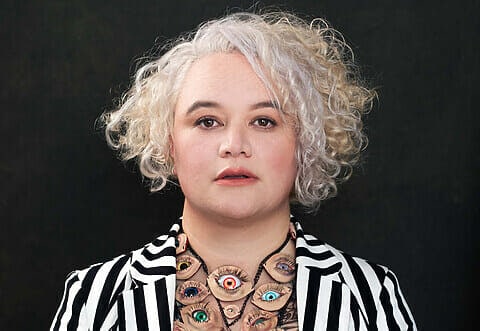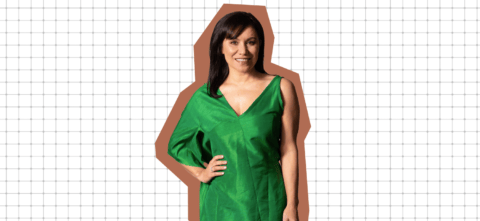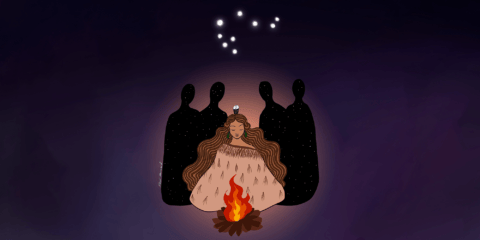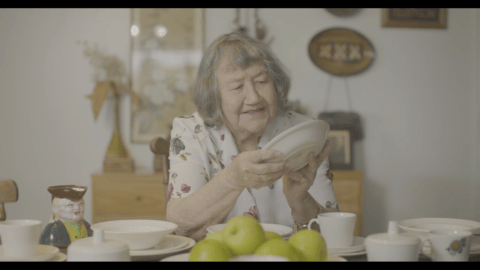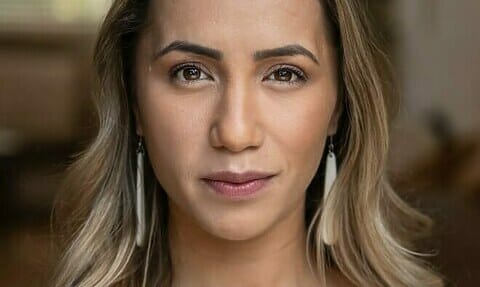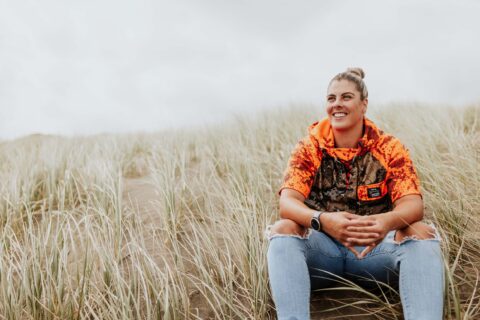More than one mother tongue? No problem for the whānau of Te Ataahia Hurihanganui. She shares her story about raising multilingual children with Siena Yates.
Most people have a hard enough time just teaching their kids one language, making sure they have what they need to express themselves while also praying they don’t regurgitate swear words to their teachers. One Masterton mum, however, is on a mission to raise her two children to be not only bilingual, but trilingual.
For Te Ataahia “Taahia” Hurihanganui’s kids, English (in a predominantly English-speaking country) has come automatically. Te reo Māori also comes easier for them than for most – Taahia is a fluent speaker, her husband is at a comfortable, conversational level, the kids are in a reo-friendly Montessori school and their grandparents are native speakers, too. But neither of those is the main language in their household – that, thanks to Taahia’s beloved husband Davide Castorina, is Italian.
“It’s at the point where it absolutely feels unnatural for us to speak in English or in Māori to each other, to be honest,” says Taahia with a bashful laugh. “We did that really purposefully knowing that English is going to happen regardless, and because all of my whānau speak te reo, they would also have access to that.”
Making Italian the focus means the kids – Mario, five, and Māreikura, two – are fluent in their father’s native tongue and are able to not only converse in Italian, but act as translators between both sides of the family, switching effortlessly between English, Māori and Italian – a major plus when fielding family Zoom calls, particularly with Davide’s family still locked down in Rome.
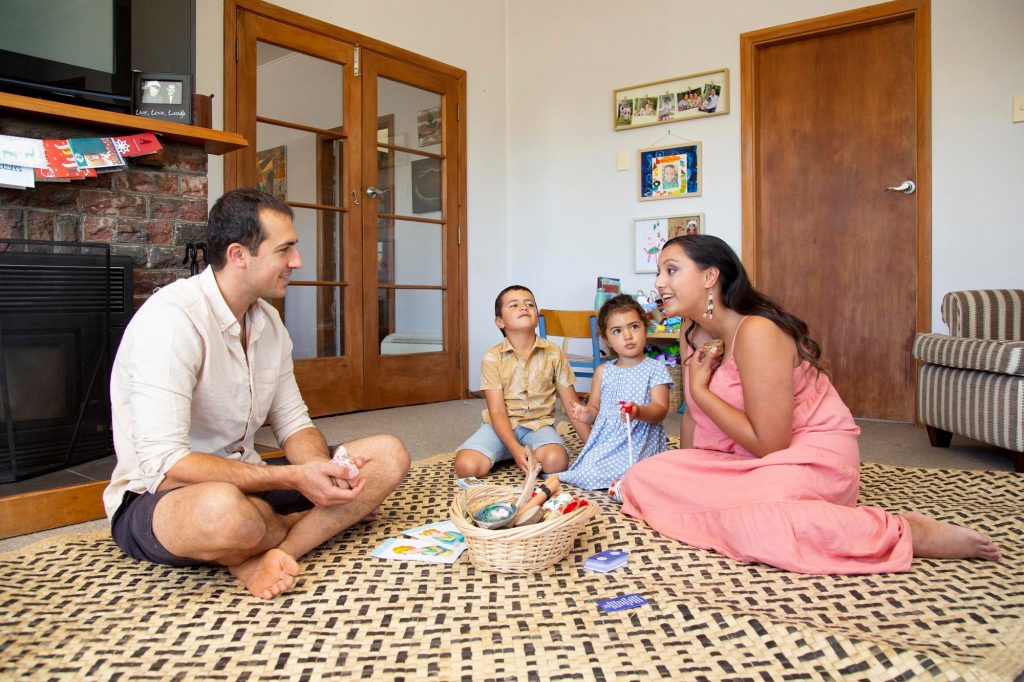
PHOTO BY LUCIA ZANMONTI
The slight downside is the whānau’s reo is slipping, to the point where Taahia is having to make specific efforts to bring it back. The family’s favourite method? Whāriki time.
A language teacher and reo consultant with years of experience under her belt, Taahia, 30, knows the importance and value of what she calls “language domains” – immersive moments of language focus.
For her whānau, that’s an hour every Monday afternoon where they roll out the whāriki (mat) and kete (basket) full of games and taonga. “That’s kind of the symbol of, ‘OK, it’s te reo time’, and as soon as you step on the whāriki, we only speak in te reo Māori.
“It’s fun because they just think they’re having this really cool, quality hour with Mum and Dad, and they almost don’t even realise they’re speaking in te reo. It is beautiful because they’re very culturally grounded, so they know totally who they are, and they’re now learning how to articulate that which is really special.”
Taahia’s love of language goes way back to her childhood. She was born in Masterton to a father who was from a staunch, reo-speaking whānau and who was a keen linguist and reo teacher, ensuring she grew up surrounded by the language not just at home, but in kōhanga reo and kura kaupapa, despite the fact the movement was in its very early stages.
“The memories I have of this place are really beautiful and rich because I was a child who got to have big gardens, space and trees, and eat food from our garden, which you probably wouldn’t get as a child in Wellington,” she reminisces.
That’s where her family moved when she was about nine years old, and where she spent the bulk of her teen and adult life. They moved for her dad’s work as a reo lecturer, but also to find a kura – or, as it turned out, a rumaki (full immersion) reo unit – that was “up to scratch” for Taahia and her siblings.
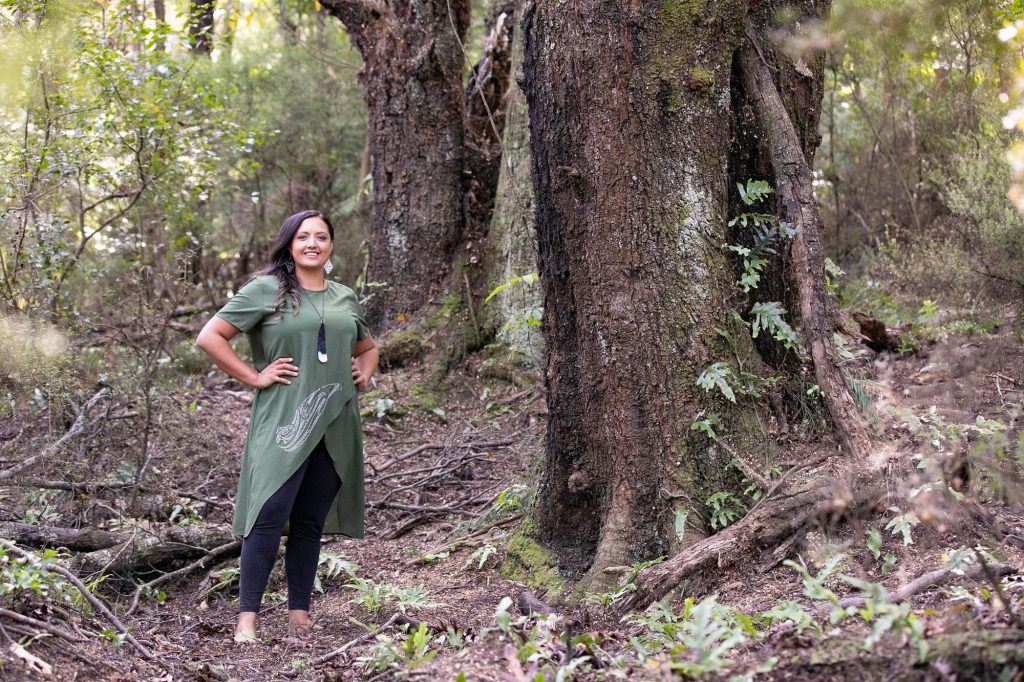
PHOTO BY LUCIA ZANMONTI
Things really kicked up a notch in her last year of high school, when she went on a year-long exchange to Costa Rica, which resulted in Taahia becoming fluent in Spanish and instilled in her a deep love of travel and learning about different cultures and languages.
Italian didn’t come into the picture until after she returned to New Zealand and her cinematically epic love story began.
A friend was celebrating an anniversary related to her time spent living in Italy and invited Taahia to an Italian lunch – but pickings were slim in Wellington at the time and the only place they could find to eat was a wildly inauthentic, Italian-inspired café in Berhampore.
Unimpressed, Taahia took one look and was about to walk out when a “real sexy accent” stopped her in her tracks. It was Davide.
“He said something like, ‘Do you have everything you need that’s in the window?’ And he was pointing at the cabinet,” she laughs. “It was love at first… voice? Then I saw him and I just thought he was bloody beautiful.” She went back out to her friend to report that the café was awful, but they were eating there anyway and her friend agreed.
“For me it was just viewing pleasure. But for her, it was just to be around the language again. It was really random. He wouldn’t even normally work on that day – he was covering for someone. It was all fate.”
If that isn’t coincidence enough, it later transpired that Davide literally lived on the same street as Taahia, and so they spent the next three months in each other’s pockets. They lived out the kind of summer love story romance novels are made of, before the end of Davide’s working holiday visa forced them to separate.
He returned to Italy, she went to Victoria University of Wellington to study linguistics and anthropology, but they never gave up on each other. They formed a plan for Taahia to do an exchange to Davide’s home city of Rome in her second year of uni, but limited to patchy Skype calls and lengthy emails, they couldn’t actually wait that long. Davide was back six months later and, in the first weekend, he proposed and presented her with a ticket to Rome.
“I was just like, ‘Holy moly, that’s really disruptive, but totally makes sense to how I’m feeling. I need to stop just doing what society expects me to do and what my family expects – and I’m not even focused on my degree right now anyway, so I need to at least go and see if it’s gonna work. And if it does, then it’s more than what everyone else is telling us it is.’”
They were only 19 at the time and their families thought it was little more than teenage infatuation bred from a summer fling. But Taahia had “completely fallen for the guy” and soon fell for Italy too. The pair spent the next four years splitting their time between countries, travelling back and forth every few months.
To get by, Taahia studied an ESOL (English for Speakers of Other Languages) degree at an international school called Global Tesol. She’d never particularly wanted to be a teacher, but simply knew she had no qualifications and no income – and she didn’t want to have to rely on Davide – so that’s what she did. It was only once she had started that she discovered she actually really enjoyed teaching.
“I didn’t realise how much I’d been observing my dad over the years and how much he had impacted some of his students,” she reflects now.
When they finally got sick of all the back and forth, the couple moved permanently to New Zealand in 2013. Taahia tried to find ESOL teaching jobs but, in an English-speaking country, it wasn’t easy. She landed in community education, largely supporting refugee girls and women, until 2015 when a reo Māori teaching position opened up and, having spent so much time away and “craving” the culture and language, it was a no-brainer.
“It was a time when people started really valuing te reo Māori, possibly because the first lot of kura kids were becoming adults then,” she muses. “So, our lessons went from just me and one other tutor doing maybe a couple of evenings a week, to every night of the week, to all of a sudden having to hire new tutors. By the end of 2016, there were about seven of us.”
From there, she had students asking if she could teach at workplaces, which she started doing. Eventually, she managed to turn it into a full-time living and start her own business, Reo Rua – which was perfect timing, as she and Davide were starting their family and she was able to make her mahi fit around motherhood, instead of the other way around.
It worked for her lifestyle, it was good money and, more than that, it fed her wairua.
“It’s being in my reo, being in my culture, sharing what I love about it with others and how beautiful we are as a people. Then I get to come home and be a mum during the day. It was a win-win!”
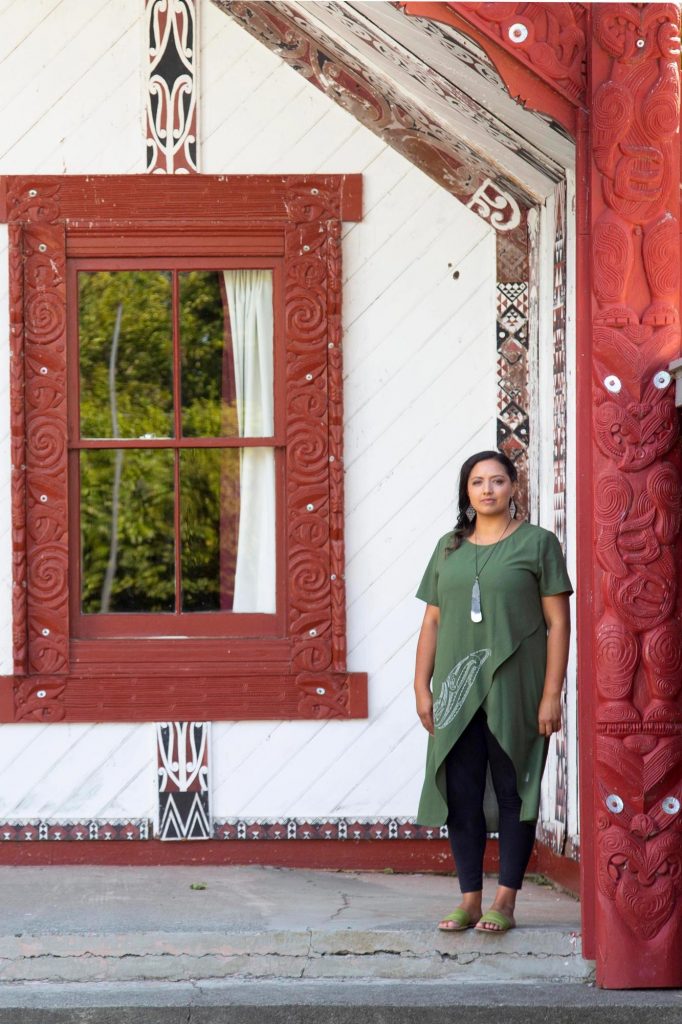
Because of her mahi and her passion, Taahia knew that imparting her multilingualism to her children was going to be a huge priority, “because I just love how much it has given me in my life”.
Te reo Māori was such a huge part of her identity, and the other driver was, she says, “if we’re raising our babies in New Zealand, how are they going to converse with your parents who don’t speak a word of English? We need to give them that, because otherwise the connection is just not going to be as strong.”
Now, Mario and Māreikura speak to their Italian whānau every day and, before Covid brought the world to a halt, used to visit regularly. The goal now is to get to a point where Davide, 35, only speaks to the children in Italian, and Taahia only speaks to them in te reo Māori.
“We don’t want it to be rushed, but we’re also being mindful that once Mario is about six or seven, it gets really hard to naturally acquire language and we don’t want any of it to feel like it’s being taught. We just want it to be a natural, organic, conversational language,” says Taahia.
We don’t want any of it to feel like it’s being taught. We just want it to be a natural, organic, conversational language
She’s seen first-hand how effective it can be teaching kids in this way. She recalls working at a daycare in Rome where all of the kids, at only two or three years old, spoke three or four languages – minimum.
“We don’t understand as New Zealanders, because we are a monolingual society, that we’re actually the minority in the world. There are more people in this world who speak two or more languages than don’t, and people don’t quite get that. So, it’s funny because people meet me now with these beautiful multilingual little babies and they’re like, ‘Wow’. And I’m just like, ‘Well, it wasn’t like they came out of me like that,” she laughs.
“Whatever you give kids, they’re just going to make sense of it. It doesn’t matter how much of it you give, they completely live in it really comfortably. They don’t overthink it – they just get it and start to understand context and figure it out.
“That’s what’s incredible about this; the story iss not so much about how we’re parenting, it’s about how children are just children, and how amazing they are.”

